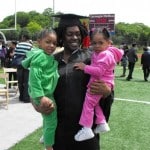An Engineering Kind of Mind
CompetencyWorks Blog
 It was during my five-year-old’s visit to pre-calculus class in my second year out of college and teaching “back home” that I realized: My baby was a more confident thinker than the “big babies” who sat in silence before me. They stared at me as if frozen by the question I’d just posed about the dimensions of those dreaded fractions. What was it that I had intentionally taught my five-year-old daughter that made her so eager where my students were hesitant? It couldn’t have been a hard question; I’d modeled it first, and my daughter even answered correctly! My students had fallen victim to simply doing math over the years and not learning math.
It was during my five-year-old’s visit to pre-calculus class in my second year out of college and teaching “back home” that I realized: My baby was a more confident thinker than the “big babies” who sat in silence before me. They stared at me as if frozen by the question I’d just posed about the dimensions of those dreaded fractions. What was it that I had intentionally taught my five-year-old daughter that made her so eager where my students were hesitant? It couldn’t have been a hard question; I’d modeled it first, and my daughter even answered correctly! My students had fallen victim to simply doing math over the years and not learning math.
At that moment, I too was paralyzed as I flashed back to days as an undergraduate, emotionally drained and nearly stripped of my confidence. High school in my neighborhood rarely required critical thinking skills, but ChemE—engineering at a “New Ivy” school—was different. Engineering required extensive problem solving by analyzing systems, but systems thinking was never explicitly taught. Through the “blood, sweat, and tears” I remained hopeful in my abilities. How was I to intentionally teach optimism to1fifteen-year-olds, something that I simply shared with my inquisitive Kindergartener through dramatic play and conversations? Could I really make a difference for these students, and was what I had to teach them enough?
It was that moment that further reinforced my #1 “enduring understanding” from college:
Problem solving is first a battle of confidence.
Was I really capable of building their confidence? Confidence is best built when given multiple opportunities to “emphasize deep understanding rather than shallow knowledge, and be actively engaged in solving meaningful problems?”1 The art of pedagogy requires teachers to engineer and re-engineer classrooms daily to find the delicate balance between “21st century skills, rigor, and relevance” to ensure career and college readiness after high school. The K–12 Engineering Standards set forth by the NC Engineering Standards Design Team suggests the use of engineering as an “integrator and bringer of relevance”2 and offers measurable content standards to support core engineering ideas.
They also offer a list of Engineering Habits of Mind. Teachers use the same engineering habits of mind daily in the work they do. Here are some obvious examples.
- Systems thinking: teachers get the “Big Picture,” starting with the end in mind.
- Communication: teachers are the best at delivering messages and can differentiate accordingly.
- Collaboration: teachers work together to individualize student learning using best practices.
- Optimism: it’s self-explanatory since pay clearly isn’t why teachers stick around to ensure that all students learn.
- Creativity: bridging engagement gaps calls for relevant connections in lesson design.
- Ethical considerations: teachers always balance appropriateness of content depth and breadth.
When educators shift their role from disseminators of information to engineers of lifelong learning, students will go from information regurgitation to knowledge application. For grades PK–12, I say it starts with our classroom engineers—the teachers. “The justification for promoting engineering and technology seems clear.”3 Not only is it clear, it seems pretty natural.
Footnotes
-
P21 Common Core Toolkit, 44.
-
NC Engineering Standards Design Team, draft of North Carolina K–12 Engineering Standards.
-
Rodger W. Bybee, “K–12 Engineering Education Standards: Opportunities and Barriers,” Technology and Engineering Teacher, February 2011, 21–24.
LaToya M. Williams has always known she was destined to become an educator from an early age. She received her education at Carnegie Mellon University in Chemical Engineering and minoring in Biomedical Engineering. After college she returned to her hometown of rural Gaston, North Carolina to teach AP Statistics and Pre-calculus. She has worked at KIPP Gaston College Prep and KIPP Pride High School. She is now consulting with KIPP Gaston Primary to integrate research based best practices, technology, engineering, arts, and sciences into the curriculum for 90 incoming kindergarteners.